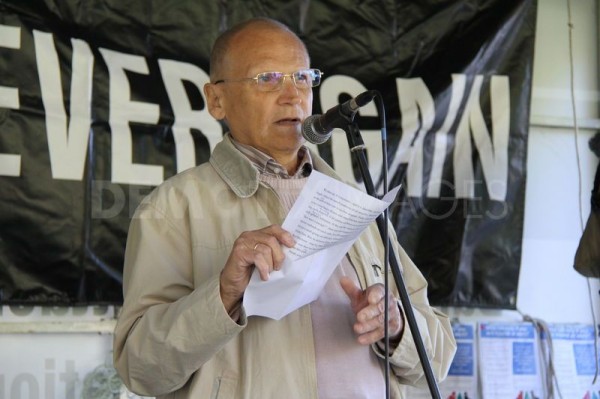Anti-nuclear campaigner, Colonel Valery Yarynich, formerly of the Soviet Strategic Rocket Forces, has died on the 13th of December in a hospital in Moscow. John Hallam of the Australian campaigning group, People For Nuclear Disarmament, has written this obituary recalling his last visit to Australia.
I last saw Colonel Yarynich in Sydney, Australia, last August, as I organised a speaking tour for him. The tour was highly successful, and there was time for him ‘to see Kangaroos and emus in Gosford’ and for a leisurely train trip to and from Canberra, where he met with officers of DFAT, and former Australian Foreign Minister Gareth Evans. The Australian trip involved speaking engagements with the Australian Institute of International Affairs, The Lowy Institute, the Centre for Nuclear Nonproliferation and Disarmament, the Centre for Peace and Conflict Studies and the Hiroshima Day Committee. It also generated a number of media interviews, notably with Late Night Live and ABC-TV (various programs), and SBS. He made page 2 of the Sydney Morning Herald.
Colonel Yarynich in his earlier life was deeply involved in the Soviet nuclear command and control system. He played a crucial part in the operationalisation of the ‘doomsday machine’ or second – strike system known as ‘Perimitr’. In his later life since retiring from active service, he was very much involved in the campaign to lower the operational readiness of nuclear weapon systems, taking a crucial role in the Foreign Affairs article ‘One Hundred Nuclear Wars’, in which 100 simulations of nuclear war are done, showing that arguments that there might be a ‘destabilising’ ‘re-alerting race’ if nuclear weapons in the US and Russia are taken off high alert, are in fact incorrect. Colonel Valery’s contribution has been to show this with statistical rigor. He also published widely.
I knew Colonel Valery only in the last years of his life, and it was my privilege to have been with him pretty much continuously during the last period in which he continued to promote de-alerting. On the day before he left Australia, he mentioned almost casually, that he was due to go into hospital as soon as he arrived in Moscow. I had replied something like ‘then I hope that after that we meet again in Moscow’. Months later, I heard that he was in a bad situation medically, with a large tumour that had to be operated. I then had an email from him that sounded quite cheerful and hopeful. Then another silence, and an email saying the operation had taken place and he was weak. Then yesterday an email saying he had passed away. So we never got to see each other.
Colonel Valery is not replaceable. As someone with nuts – and – bolts experience in Soviet nuclear command and control, who had come to see the necessity both to get rid of nuclear weapons and to lower their operational status, he was unique. He was in a way, a ‘Doctor Strangelove’ who had come in from the cold. Such people are rare and irreplaceable. A chance conversation with him in an anonymous cafe in Vienna over a beer led to the setting up in Sydney of the ‘Human Survival Project’, dedicated to the task of ensuring that decades down the track we are all still here to tackle other problems of global justice, global warming, etc., etc., by reducing or eliminating the risks of a self-made nuclear apocalypse.
My most poignant memory of him comes from a four-hour train trip to and from Australia’s capital, Canberra. He pressed his face close to the window, outside of which rolled a benign landscape with patches of Australian bush and green fields with cows and horses. He sighed, and said something like ‘It’s so beautiful. I wish I did not have to think of terrible things all the time’.
Those of us left will still have to deal with those terrible, world-destroying, issues that were your life. We salute you, Colonel Yarynich.
Col. Velery Yarynich, a retired colonel, served as a specialist in command, control, and communications in the Soviet Strategic Rocket Forces from 1959 until his retirement in 1986. From 1986 until 1992 he served at the Centre for Operational-Strategic Research in the General Staff. After his retirement from active duty in 1992, Yarynich conducted scholarly work at the Institute of World Economy and International Relations of the Russian Academy of Sciences and at California State University, San Bernardino. Among his publications is the book C3: Nuclear Command, Control, Cooperation. Before he passed away he was a researcher with the Institute for US and Canadian Studies in Moscow.
He is survived by a wife and two daughters.
John Hallam,
PEOPLE FOR NUCLEAR DISARMAMENT
Sydney, Australia






